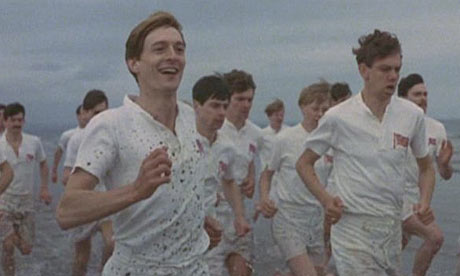pauljeremiah
Gold Member

I woke up at 6 am on New Years day, and decided to pass the time by watching a film I have never seen before. I thumbed through my blu ray collection and came across a film I picked up in London last November, but had yet to watch (it was still in its plastic), and the film was the Oscar winning Chariots of Fire.
Like most people who have grown up in the UK & Ireland, I was extremely familar with the score of the film and the famous opening shot but I had never actually watched the film.
Based on a true story, it centers on two gifted athletes and their quest to run in the 1924 Olympics. The first is Harold Abrahams (Ben Cross), a haughty sprinter with an obsession for winning. Abrahams, who is Jewish, is a man with something to prove, mostly to himself. His rival is Eric Liddell (Ian Charleson), the first man to ever beat him in a sprint. Liddell is a devout Christian and runs for the glory of God.
There is an exquisite interplay of subtle themes in this film underlying the obvious sports tale. There is the contrast of motives. Abraham runs to validate his feeling of personal power, and his preoccupation with winning is actually motivated by his fear of losing. His quest is torturous, and ultimately his victory empty, more of a relief than a triumph. Liddell runs out of a desire to repay God for the physical gifts he has been given. He is at peace with himself, but at odds with all those who want to control him. Their rivalry represents a battle between the forces of the physical and spiritual. Other themes pervade the film. We have undercurrents of bigotry against the Jewish runner, a man of whom Cambridge was begrudgingly proud while berating him behind his back. We have sinister political attempts at manipulation in the face of Liddell's staunch integrity in adhering to his principles. Together, these forces combine to produce a film rich in drama and meaning.
The film has been criticized for its inaccuracies. Some say Abraham did not suffer from anti-Semitic bigotry and that he was wildly popular at Cambridge. This does not necessarily mean he didn't feel inferior. No one can know what childhood experiences might have affected his psyche. Jackson Scholz was quoted as saying he never gave Liddell a note of encouragement on the track. I have to agree that this was a bit of Hollywood drivel that didn't need to be there. Additionally, Liddell knew weeks before that the heats would be on a Sunday, not just before the race as shown, and he was always scheduled to run the 400-meter race. The meeting of political bigwigs that allowed him to switch from the 100 to the 400 was pure fabrication to emphasize his resistance to compromising his beliefs about running on the Sabbath. However, these liberties can be forgiven because they enriched the story and did not change history in major ways.
It's a bit of a pity that the movie, long though it is, could not have delved more deeply into the other characters' background. Lord Andrew Lindsey is particularly appealing as Harold's and Eric's faithful friend who gives up his spot in his specialty race (the 400 m) to allow Eric a chance at the gold. Sybil Gordon is wonderful as Harold's love interest who tries to draw him out of his lonely world of bitterness and resentment and self-hatred ("You ran like a God. I was proud of you...", even after Harold loses a race for the first time in his life to a more determined Eric). Even some of the American competitors, who are only peripherally portrayed in the concluding segments, lend some colour. Jackson Scholtz' reaching out to Eric Liddell gives one the sense that he knows the greatness of spirit that quietly resides in this unassuming Scotsman.
Its a wonderful story wonderfully told, and when its over you find yourself longing for it to continue, to see how these characters we've come to know over the previous two hours will turn out in the rest of their lives. Alas, the story of their lives is noted only in subtitles as the film closes.
